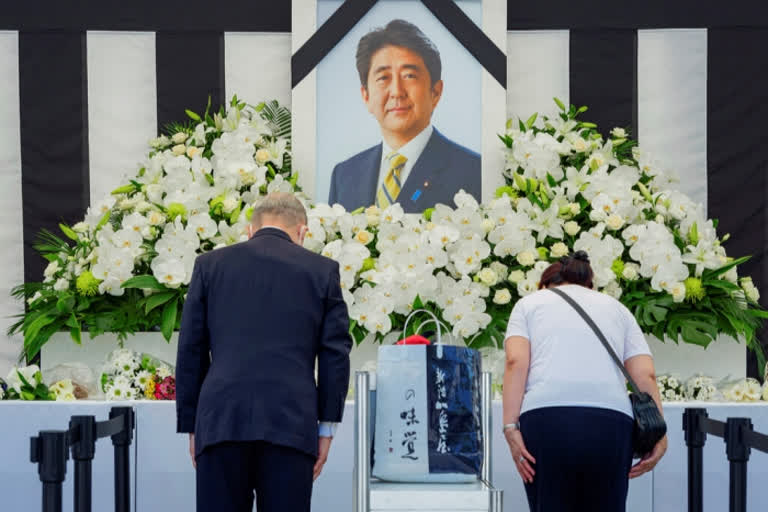Tokyo: A tense Japan prepared Tuesday for a rare and controversial state funeral for assassinated former Prime Minister Shinzo Abe, the longest-serving leader in his nation's modern history and one of the most divisive. Tokyo was under maximum security, with angry protests opposing the funeral planned around the capital and nation. Hours before the ceremony began, dozens of people carrying bouquets of flowers queued at public flower-laying stands at nearby Kudanzaka park.
Thousands of uniformed police mobilized around the Budokan hall, where the funeral is being held, and at major train stations. Roads around the venue are closed throughout the day, and coin lockers at main stations were sealed for security. World leaders, including U.S. Vice President Kamala Harris, were in town for the funeral. Opponents of the state-sponsored funeral, which has its roots in prewar imperial ceremonies, say taxpayers' money should be spent on more meaningful causes, such as addressing widening economic disparities caused by Abe's policies.
Prime Minister Fumio Kishida has been criticized for forcing through the costly event to honor his mentor, Abe, who was assassinated in July. There has also been a widening controversy about Abe's and the governing party's decades-long close ties with the ultra-conservative Unification Church, accused of raking in huge donations by brainwashing adherents. Abe's alleged assassin reportedly told police he killed the politician because of his links to the church; he said his mother ruined his life by giving away the family's money to the church.
Kishida says the longest-serving leader in Japan's modern political history deserves a state funeral. The government also maintains that the ceremony is not meant to force anyone to honor Abe. Most of the nation's 47 prefectural governments, however, plan to fly national flags at half-staff and observe a moment of silence.
Opponents say Kishida's one-sided decision, which was made without parliamentary approval, was undemocratic, and a reminder of how prewar imperialist governments used state funerals to fan nationalism. The prewar funeral law was abolished after World War II. The only postwar state funeral for a political leader, for Shigeru Yoshida in 1967, also faced similar criticism.
"Spending our valuable tax money on a state funeral with no legal basis is an act that tramples on the constitution," organizer Takakage Fujita said at a protest Monday. About 1.7 billion yen ($11.8 million) is needed for the venue, security, transportation and accommodation for the guests, the government said. A group of lawyers has filed a number of lawsuits in courts around the country to try to stop the funeral. An elderly man last week set himself on fire near the prime minister's office in an apparent protest of the funeral.
